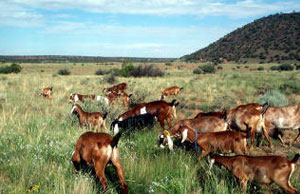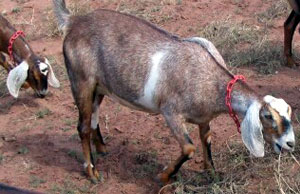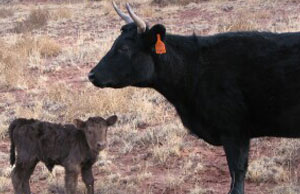 After they retired and moved to Snowflake, Arizona, from Tucson, Kathryn and David Heininger thought it would be fun to have a goat or two around their 280-acre Black Mesa Ranch in the White Mountains of Northern Arizona. David liked to cook and thought he would use the goats’ milk to try his hand at making goat cheeses.
After they retired and moved to Snowflake, Arizona, from Tucson, Kathryn and David Heininger thought it would be fun to have a goat or two around their 280-acre Black Mesa Ranch in the White Mountains of Northern Arizona. David liked to cook and thought he would use the goats’ milk to try his hand at making goat cheeses.
Less than three years after they purchased their first goats in 2001, the Heininger’s had built a certified dairy. They are now respected Nubian goat breeders and producers of award-winning farmstead artisan goat cheeses.

“It was originally a hobby. We started out with two goats, thinking we’d just drink the milk, make a little cheese for ourselves and sell their kids (baby goats). Well, things didn’t work out that way. We both fell in love with goats completely and David soon got really excited about the cheese-making side of things. I guess it was meant to be,” says Kathryn, who has even published a guide for beginning goat farmers.
The company now raises 35 full-sized, purebred Nubian goats and sells its cheeses to local restaurants, natural food stores, grocery stores, and directly to consumers through its website, www.blackmesaranch.com.
When the Heiningers learned about Humane Farm Animal Care and the Certified Humane Raised and Handled® label, they decided to try to join the program.
“We weren’t attracted to organic certification. But, the Certified Humane guidelines are based on what’s good for the animal. It’s a common-sense approach, and that appealed to us,” says Kathryn.
The Heiningers now spend their time milking their goats — twice a day in high season — making cheese, and rehabilitating and improving their property “with an eye toward self-sufficiency and a plan for sustainability.” They have no employees or nearby neighbors, so the goats, in addition to being productive, provide David and Kathryn with their main source of companionship at the ranch.

“We have come to really love them, as much for their individual personalities as for their productivity. If you raise them right, goats are friendly and affectionate,” says Kathryn.
Some of Black Mesa Ranch’s kids actually live in the house with Kathryn and David for the first few days of their lives. The kids are all bottle-fed and cuddled, which helps them bond with people. They remain integrated with the main herd their whole lives thanks to creative management techniques that allow them to bond to their mothers without learning to drink from them. The young goats also tag along on the herd’s long free-range walks. Exposure to a variety of situations, noises and other ranch animals — including the ranch’s livestock guardian dogs — helps develop a mellow, unflappable personality as they mature.
“Their varied upbringing helps them become accustomed to changes in their schedules and environment which helps reduce the stress of leaving the herd if they are sold. It also makes them very trusting and loving.”
The couple hosts the public at Black Mesa Ranch on specific open-house days, inviting them to meet the goats, visit the cheese kitchen, and sample and buy goat cheeses and the Heiningers’ homemade seasonal candies.
For information on where to find other Certified Humane® products in your area, visit the “Shop” page of HFAC’s website.

Black Mesa Ranch
Posted: January 31, 2014 by Certified Humane®
Less than three years after they purchased their first goats in 2001, the Heininger’s had built a certified dairy. They are now respected Nubian goat breeders and producers of award-winning farmstead artisan goat cheeses.
“It was originally a hobby. We started out with two goats, thinking we’d just drink the milk, make a little cheese for ourselves and sell their kids (baby goats). Well, things didn’t work out that way. We both fell in love with goats completely and David soon got really excited about the cheese-making side of things. I guess it was meant to be,” says Kathryn, who has even published a guide for beginning goat farmers.
The company now raises 35 full-sized, purebred Nubian goats and sells its cheeses to local restaurants, natural food stores, grocery stores, and directly to consumers through its website, www.blackmesaranch.com.
When the Heiningers learned about Humane Farm Animal Care and the Certified Humane Raised and Handled® label, they decided to try to join the program.
“We weren’t attracted to organic certification. But, the Certified Humane guidelines are based on what’s good for the animal. It’s a common-sense approach, and that appealed to us,” says Kathryn.
The Heiningers now spend their time milking their goats — twice a day in high season — making cheese, and rehabilitating and improving their property “with an eye toward self-sufficiency and a plan for sustainability.” They have no employees or nearby neighbors, so the goats, in addition to being productive, provide David and Kathryn with their main source of companionship at the ranch.
“We have come to really love them, as much for their individual personalities as for their productivity. If you raise them right, goats are friendly and affectionate,” says Kathryn.
Some of Black Mesa Ranch’s kids actually live in the house with Kathryn and David for the first few days of their lives. The kids are all bottle-fed and cuddled, which helps them bond with people. They remain integrated with the main herd their whole lives thanks to creative management techniques that allow them to bond to their mothers without learning to drink from them. The young goats also tag along on the herd’s long free-range walks. Exposure to a variety of situations, noises and other ranch animals — including the ranch’s livestock guardian dogs — helps develop a mellow, unflappable personality as they mature.
“Their varied upbringing helps them become accustomed to changes in their schedules and environment which helps reduce the stress of leaving the herd if they are sold. It also makes them very trusting and loving.”
The couple hosts the public at Black Mesa Ranch on specific open-house days, inviting them to meet the goats, visit the cheese kitchen, and sample and buy goat cheeses and the Heiningers’ homemade seasonal candies.
For information on where to find other Certified Humane® products in your area, visit the “Shop” page of HFAC’s website.
Category: bios, Blog